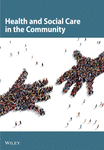Choices and voices: a case study of a self-advocacy group
Abstract
This paper reports on one part of a study which examined the exercise of choice by adults with learning difficulties: a case study of a Members' Council within a “flagship” resource centre. The Council was a self-advocacy group set up to represent members' interests and offer advice to centre management about aspects of service delivery. Fourteen meetings of the Members' Council were tape-recorded, and interviews conducted with 12 individual members and five professionals. The members' ability to exercise choice was closely related to issues of power and control on several levels, with potential points of tension being identified. These included the contribution of different parties to constructing the agenda, the balance between “domestic” and “external” interests and the challenge to democratic decision-making arising from the differing personalities and abilities represented in the group. Certain “parameters” of choice-making had been set out by centre management, with four categories of issue emerging from the data, in relation to which the council had varying degrees of autonomy. A particular strength of the council was its independent adviser, who was skilled in achieving a delicate balance between supporting people in making informed choices without exerting undue influence. Professionals were agreed that the process of choice-making was more important than outcome, but had different views about how best to facilitate it. Both “proactive” and “non-interventionist” approaches, if taken too far, run the risk of disabling peoples' own ability to exercise choice. In the members' view outcomes, in the form of tangible achievements, were at least as important as process. In conclusion, a significant tension is identified between structure and process for “in-house” groups, indicating that while people can make important “developmental” gains from self-advocacy, “instrumental” achievements are likely to be constrained for service-based groups.




